Our Favorite Manchester Hotels
• 5-star: Edwardian
• 4-star: Yotel
• 3-star: Ainscow
• For Couples: Gotham
• For Families: Clocktower
• Best Pool: Hilton Deansgate
• Deansgate Station: Hilton Deansgate
• Manchester Victoria Station: Indigo
• Old Trafford Stadium: Football
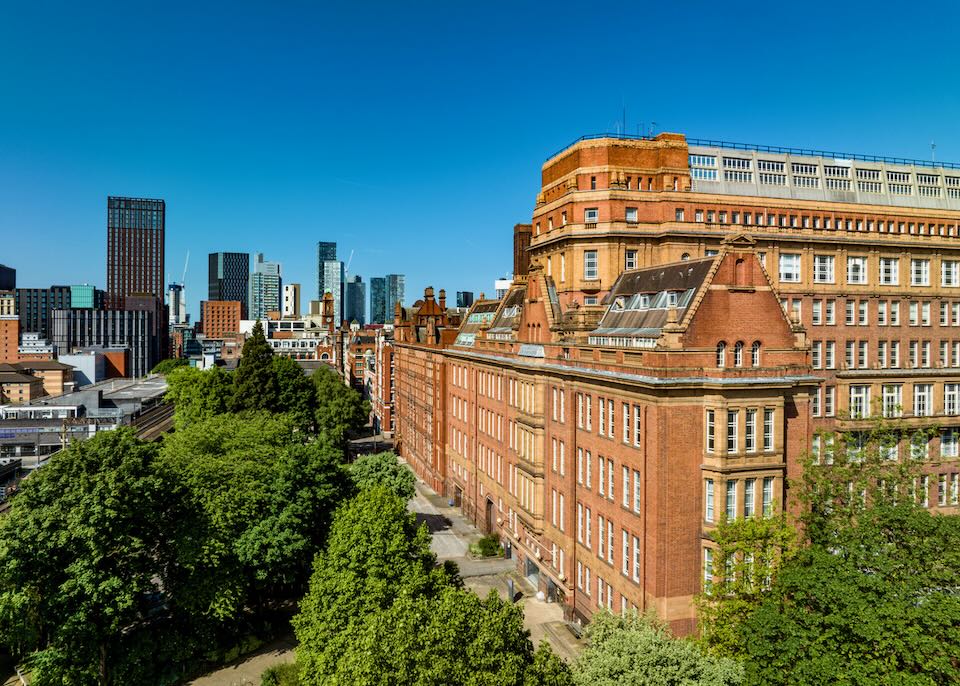
Victorian Sackville Street in Manchester’s Gay Village neighborhood, with modern urban towers in the background.
Flanked by the River Irwell and bisected by the Rochdale Canal, England’s third-largest city is a gritty charmer. Spend a few days here among Mancunians (local term for Manchester’s residents) and you’ll come to appreciate why they love this lively northern powerhouse. Manchester became the epicenter of the Industrial Revolution in the second half of the 18th century, when its steam-powered cotton mills made it a hub of England’s textile industry and the city grew bigger and wealthier. While the manufacturing went into decline in the 20th century, Manchester has since bounced back. Its football (soccer) teams are second to none and after the city’s musical renaissance in the 1990s, it’s cemented its place as a music industry giant. Manchester’s impressive cultural heritage, superb museums, and edgy dining and nightlife scene will make you wish you could linger longer.
Many of Manchester’s best hotels – ranging from 5-star icons to quirky boutique pads – are dotted across the City Centre, with more boutique offerings in the Northern Quarter and Gay Village, while farther out, you’ll find more generic chain hotels in Salford, and low-key options in Chorlton, Didsbury and Castlefield. Manchester is a large city – about the size of Phoenix, AZ – but in spite of its size, its central neighborhoods are very walkable, and there are good public transportation connections to neighborhoods farther out.
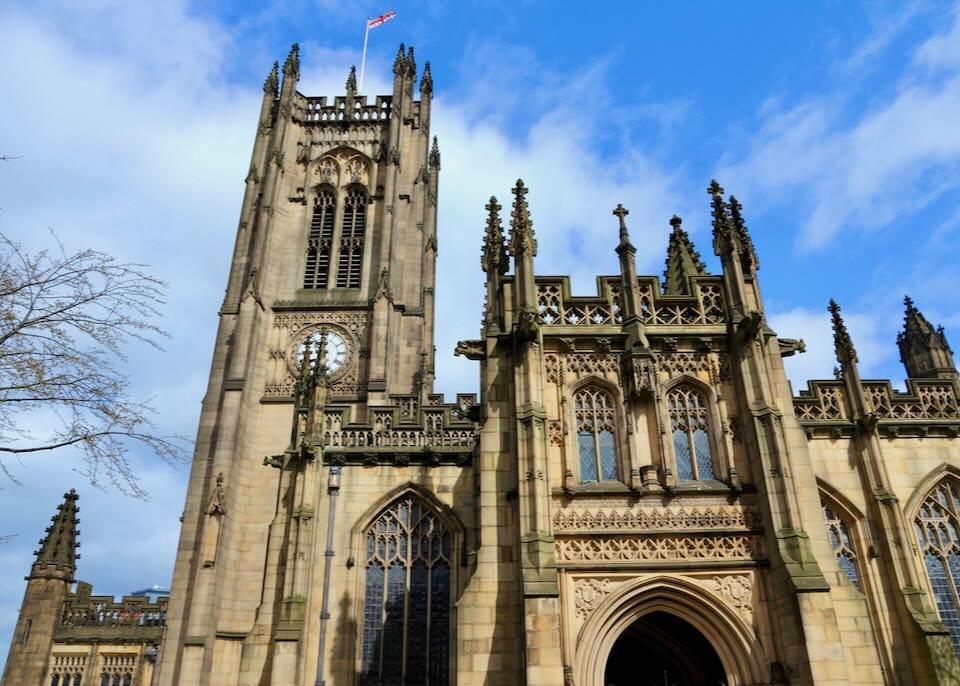
Manchester Cathedral in City Centre.
Manchester Neighborhoods
Your first port of call is likely to be the very walkable City Centre – Manchester’s most central neighborhood, bordered to the south by Deansgate and to the north by Manchester Victoria – the city’s two main train stations. Here you’ll find the city’s best shopping, varied dining, some excellent bars, and the city’s financial district, as well as a couple of attractions.
Sitting between the City Centre to the west and Gay Village to the east, Chinatown is a tight grid of streets, dotted with excellent Chinese restaurants. It’s the UK’s second-largest Chinese community hub, and its food markets are fun to browse. While short on accommodations, Chinatown is home to a superb art gallery and explodes with color during Chinese New Year displays in January or February.
Squeezed between Chinatown and the Rochdale Canal, compact Gay Village is Manchester’s vibrant LGBTQ neighborhood, dotted with trendy cafes and restaurants and renowned for its nightlife. It also hosts various local festivals, the most popular of which in Manchester Pride.
Northeast of the City Centre, the Northern Quarter is a buzzy neighborhood with a distinctly local flavor, famous for its nightlife, live music, independent stores, and locally-designed threads. It’s next door to Ancoats, the industrial heart of Manchester back in the day when the city was known as ‘Cottonopolis’. A rapidly gentrifying part of town, it’s former cotton mills have been converted into breweries and eateries.
A Victorian Cotton Mill in Ancoats, with the Ashton Canal running alongside into the City Centre.
Sitting on the Bridgewater Canal just south of the City Centre and a short walk from Deansgate train station, Castlefield is a mix of green spaces, arts venues, and canalside bars, and is also home to one of Manchester’s best museums. There are few accommodations here but plenty of dining options.
If you follow the Bridgewater Canal towpath southwest from Castlefield and then switch to the Manchester Ship Canal towpath, you’ll eventually find yourself at Salford Quays – formerly the city’s shipping hub and now home to an award-winning museum and a cluster of TV show-based attractions. There’s a handful of restaurants here, and if plenty to do if you’re a football (soccer) or cricket fan at nearby Old Trafford.
South of the City Centre and Old Trafford, Chorlton-cum-Hardy (or just ‘Chorlton’ for short) is a trendy residential neighborhood with good public transportation connections to the City Centre. There are plenty of green spaces here, a scattering of dining options and health food stores, and a distinctive local vibe, showcased in neighborhood festivals.
Didsbury, southeast of Chorlton, is another affluent, spread-out suburb and quiet residential area that’s well connected to the City Centre. Besides the botanical garden, its low-key attractions include the highest concentration of listed buildings (preserved historical properties) in Manchester and a popular annual arts festival.
The Best Places To Stay in Manchester
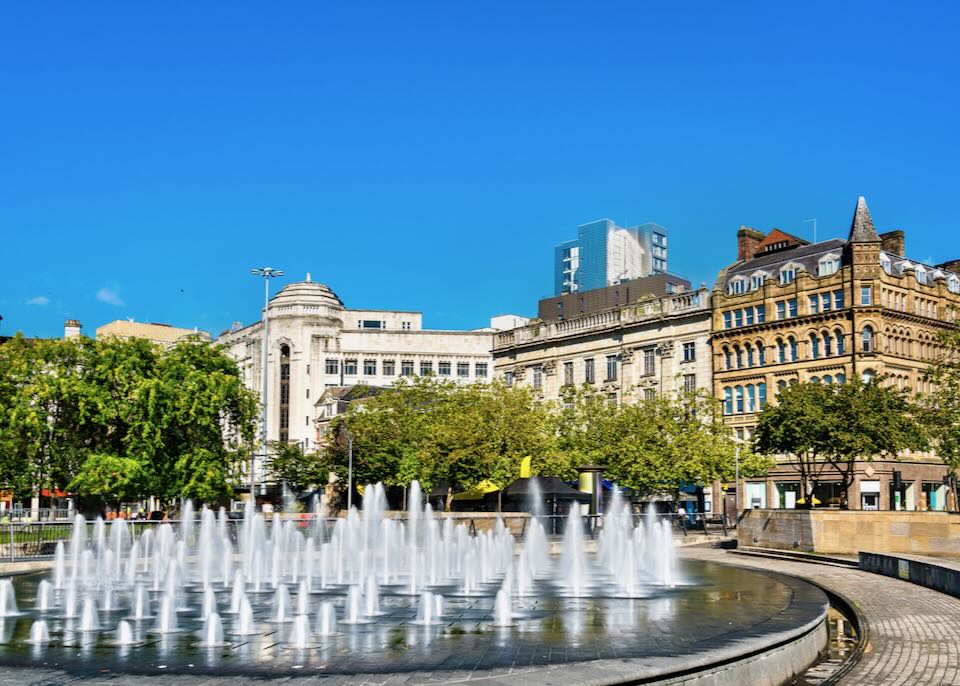
Fountains at Piccadilly garden in Manchester’s Gay Village neighborhood. BrewDog’s DogHouse Manchester is an excellent boutique hotel just west of here.
- Best Luxury Hotels in Manchester
Hotel Gotham • The Lowry Hotel • The Edwardian Manchester • The Midland- Best Boutique Hotels in Manchester
YOTEL Manchester Deansgate • DogHouse Manchester Hotel • Kimpton Clocktower Hotel- Best Cheap and Midrange Hotels in Manchester
Ibis Styles Manchester Portland Hotel • Whitworth Locke • Ainscow HotelThe best areas in Manchester for…
- Best Neighborhoods in Manchester for Sightseeing: City Centre, Salford Quays, Castlefield, Didsbury
If you’re into sightseeing, some of Manchester’s biggest attractions include the Science and Industry Museum, reconstructed Roman fort, the Castlefield contemporary art gallery and the world’s oldest railway station in Castlefield; the Manchester Art Gallery in Gay Village; Manchester Cathedral and the National Football Museum in the City Centre; and the northern branch of the Imperial War Museum (the main three branches are in London) in the Salford Quays. Didsbury is well worth a visit if you’re an architecture buff, since it has Manchester’s highest concentration of heritage buildings, and it’s also worth venturing south of the Gay Village to check out some of the highlights from the Suffragette movement, such as the home of well-known activist Emmeline Pankhurst.- Best Neighborhoods in Manchester for Nightlife: Northern Quarter, City Centre, Ancoats, Gay Village
The City Centre has a number of centuries-old, characterful pubs along Great Bridgewater Street, plus more contemporary cocktail bars off Bridge Street, King Street, and Deansgate. The Northern Quarter is particularly good for intimate live music venues, and has a dense concentration of bars to suit most tastes along Thomas Street. In nearby Ancoats, look out for former cotton mills converted into beer breweries, while the Gay Village is renowned for its lively LGBTQ bars along the canal and the parallel Richmond Street.- Best Neighborhoods in Manchester for Food and Restaurants: City Centre, Chinatown, Northern Quarter, Gay Village
There is no shortage of excellent restaurants in Manchester, and four neighborhoods in particular stand out for their edible offerings. Chinatown has a large concentration not just of Chinese restaurants but Japanese, Thai, and Vietnamese food as well. The tiny streets off Deansgate in the City Centre feature some of Manchester’s standout restaurants, such as Fazenda, Hawksmoor, Tattu Restaurant and Adam Reid at The French. Northern Quarter covers all manner of global cuisines, from Yard & Coop (with a focus on fried chicken) to Turtle Bay (Caribbean) and This & That (Indian). In Gay Village, try The Molly House (tapas bar and tearoom).- Best Neighborhoods in Manchester for Families: Didsbury, Salford Quays, Castlefield
If you’re looking for a quiet neighborhood to stay with your family while still being within easy reach of Manchester’s attractions, both Salford Quays or Didsbury are good bets. Salford Quays is better for families with older kids, with its reliable chain hotels, casual restaurants, and proximity to the Imperial War Museum with some kid-friendly displays and the Manchester United football (soccer) stadium to tour or catch a match. Castlefield is easily walkable from the dining and attractions of central Manchester but is much quieter at night and features the excellent Science and Industry Museum which showcases the city’s history and legacy via child-friendly exhibits; the only downside is that there are few accommodations there. Didsbury is best for families with young children, since there are plenty of parks for them to play in, and affordable accommodations, though dining options are somewhat limited.- Best Neighborhoods in Manchester to Stay for First Timer: Northern Quarter, City Centre, Gay Village
If it’s your first time in Manchester, and especially if your vacation time is limited, it’s hard to go wrong with any of these neighborhoods. It depends what’s a deal breaker for you: the Northern Quarter is particularly good for the local music scene that Manchester is justifiably famous for and next door to Ancoats, where you can check out the remnants of Manchester’s industrial heritage; the City Centre is walkable to many top sights, including those in adjacent Castlefield, whereas Gay Village is ideal if you’re a member of the LGBTQ community and want to be within easy walking distance of attractions in central Manchester, as well as enjoy a lively nightlife.- Most Romantic Neighborhoods in Manchester: Didsbury, Castlefield, Gay Village
“Romantic” is not the first word that comes to mind when you think of Manchester. But there is something special about strolling along Rochdale Canal in Gay Village or the Bridgewater Canal in Castlefield, hand in hand with your sweetie. Taking your other half on a picnic in the botanical garden in Didsbury in late spring, when the flowers are in full bloom, can be pretty romantic too.- Best Neighborhoods in Manchester for a Local Vibe: Northern Quarter, Ancoats, Chorlton, Castlefield
These neighborhoods each have a distinct character. Ancoats and Castlefield are particularly interesting if you want to delve deeper into Manchester’s history and industrial heritage. The Northern Quarter is Manchester’s most creative neighborhood, with a high concentration of independent stores, vinyl shops, and on-trend restaurants. And if you want to mingle with locals in an up-and-coming residential neighborhood that’s completely off the tourist trail, then Chorlton in the south of the city is the place for you.Sculling along the ship canal in Salford Quays, Manchester.
- Best Neighborhoods in Manchester for Walking: City Centre, Castlefield, Northern Quarter, Salford Quays, Ancoats
Much of Manchester is walkable, with the heart of the city made up of compact neighborhoods that are easy to explore on foot. It’s hard to beat the Salford Quays, Castlefield, and Ancoats for dockside views and the industrial vibe that the city is famous for; in Ancoats in particular you can wander past converted cotton mills. In the Northern Quarter, strolling the streets takes you past vinyl stores and independent boutiques, while in the City Centre there are many discoveries to be made in the tiny lanes off the main Deansgate thoroughfare. It’s also well worth strolling along the towpath that runs parallel to the Rochdale Canal; during the city’s industrial heyday, barges would carry the cotton from Ancoats’ cotton mills to the Salford Quays along this waterway.- Safest Areas of Manchester
In spite of its gritty reputation, Manchester is a generally safe city. All neighborhoods frequented by visitors are safe to walk around at most times of day, with Didsbury and Chorlton being the quietest. At night, it’s a good idea to stick to well-lit areas and avoid shortcuts through deserted streets. Alcohol-fueled revelry in the city’s nightspots, such as the Northern Quarter and City Centre occasionally result in fights breaking out.- Unsafe Areas of Manchester
Manchester’s unsafe neighborhoods are mostly residential and clustered to the south of the City Centre. These include Moss Side, Hulme, and Longside, and visitors have no reason to venture there. Watch out for pickpockets in busy areas, including around the train stations in the City Centre.The 8 Best Neighborhoods in Manchester for Tourists
1. Manchester City Centre
Deansgate railway station.
Sitting between two major train stations (Manchester Victoria and Deansgate), the heart of the city is bisected by the busy Deansgate thoroughfare. Towards the north end of Deansgate you’ll find numerous shopping malls, the Manchester Cathedral, and the National Football Museum, as well as centuries-old traditional pubs such as The Old Wellington. If you’re looking to catch a tram to a nearby neighborhood, Exchange Square is the busiest tram hub in town, while across the street there’s the Manchester Corn Exchange, home to an upscale food court. As you wander around, look out for such heritage buildings as the iconic Town Hall, The Bridgewater Hall, and St Peter’s Square. You’ll find numerous restaurants showcasing all manner of global cuisines in the streets off Deansgate, the popular People’s History Museum that champions the story of working people on the bank of the River Irwell, and the Manchester Opera House towards the south end of Deansgate. In December, Manchester’s Christmas markets take over the central streets.
- Best Hotels in Manchester City Centre
The Lowry Hotel • Hotel phone: +44 161 827 4000
Hotel Gotham • Hotel phone: +44 161 413 0000
The Midland • Hotel phone: +44 161 236 3333
The Edwardian Manchester • Hotel phone: +44 161 835 9929
DogHouse Manchester Hotel • Hotel phone: +44 161 467 1003
Roomzzz Manchester Victoria • Hotel phone: +44 161 870 1300
Hilton Manchester Deansgate • Hotel phone: +44 161 870 1600
Hotel Indigo Manchester • Hotel phone: +44 161 359 7499- Best Midrange Hotels
YOTEL Manchester Deansgate • Hotel phone: +44 161 511 5060
Whitworth Locke • Hotel phone: +44 161 823 05302. Chinatown
The Manchester Chinatown arch.
Compact, colorful, and dotted with bustling food markets, Manchester’s Chinatown greets you with its beautiful gilded arch on Faulkner Street, gifted to the city by the city of Beijing. This is a very compact neighborhood; unless you’re here to attend the Chinese New Year celebrations in January or February, there are two reasons to venture here: dining out, and visiting the excellent Manchester Art Gallery. The gallery showcases art across six centuries, while the dining scene runs the gamut from Sichuan and Cantonese cuisine to Japanese, Thai and Vietnamese.
- Best Hotels in Manchester Chinatown
Roomzzz Manchester City • Hotel phone: +44 161 236 2121
Clayton Hotel Manchester City Centre • Hotel phone: +44 161 433 75803. Gay Village
Looking over Canal Street in Manchester’s Gay Village.
Centered on the pedestrian Canal Street (which hosts the city’s annual Pride parade in August), this lively, compact LGBTQ+ neighborhood is liberally sprinkled with cafes, restaurants serving international cuisine, and iconic gay bars, such as G-A-Y Manchester. There are also some wonderful vintage pubs along nearby Great Bridgewater Street, such as The Peveril of the Peak and The Briton’s Protection. Neighborhood attractions include the nearby Piccadilly Gardens street food market (Wednesday to Sunday), independent vinyl stores, and the memorial to Alan Turing, the brilliant mathematician who cracked the Germans’ Enigma code during WWII. Just across the canal you’ll find the Manchester Picadilly train station, near which you can hit the upmarket department stores for some retail therapy.
- Best Hotels in Gay Village
Kimpton Clocktower Hotel • Hotel phone: +44 161 288 1111
The Alan Manchester • Hotel phone: +44 161 236 8999- Best Midrange Hotel
Motel One Manchester – St Peter’s Square • Hotel phone: +44 161 528 2400
Ibis Styles Manchester Portland Hotel • Hotel phone: +44 161 246 34004. Northern Quarter & Ancoats
A historic Ancoats alley.
With Oldham Street as its busiest thoroughfare, the hip, characterful Northern Quarter neighborhood adjoins Ancoats, which was the heart of Manchester’s 18th and 19th century cotton production – its cotton mills now converted to craft beer breweries and eclectic eateries. The Northern Quarter is renowned for its bars, pubs, and live music venues, such as Matt and Phred’s Jazz Club, Band on the Wall, and the Night and Day Café, as well as its high concentration of independent shops that sell vinyl records and vintage clothing. The city’s Christmas markets tend to spill over into the Northern Quarter.
- Best Hotels in the Northern Quarter & Ancoats
Malmaison Manchester • Hotel phone: +44 161 641 1883
Dakota • Hotel phone: +44 161 674 9180- Best Midrange Hotel
Travelodge Manchester Picadilly • Hotel phone: +44 871 984 65135. Castlefield
The North Gate of the Roman fort of Mamucium.
Just south of Deansgate in the City Centre, Castlefield is Manchester’s oldest neighborhood, as indicated by the partly reconstructed ruins of Mamucium, a Roman fort that gave the city its name. Several attractive parks put the ‘field’ in ‘Castlefield’, while remnants of Manchester’s industrial heritage include the Manchester Ship Canal, once used carry cotton to Liverpool, and from where you can now take boat tours of the city. Attractions include the family-friendly Museum of Science and Industry, the Manchester Liverpool Road railway station nextdoor (the oldest surviving railway station in the world), and the Castlefield Bowl – a popular venue for music gigs. Castelfield is bisected by Liverpool Road, where you’ll find a good concentration of restaurants.
- Best Hotels in Castlefield
Castlefield Hotel • Hotel phone: +44 161 832 7073- Best Budget Hotel
YHA Manchester Hostel • Hotel phone: +44 345 371 96476. Salford Quays & Old Trafford
Media City on the Salford Quays.
Busy with sightseers by day but quiet at night, the Salford Quays docklands were one of the busiest parts of the city during Manchster’s industrial heyday. Now they are home to the award-winning Imperial War Museum, as well as Media City, where you can tour the BBC studios or the set of hugely popular soap opera Coronation Street. The docks are easily reachable via tram from the City Centre, as is Old Trafford, just south of the Manchester Ship Canal. If you’re a fan of British sports, don’t miss a game of cricket at the namesake Old Trafford Cricket Ground, or a tour of the Manchester United Museum and Stadium, home to one of England’s most successful football (soccer) teams.
- Best Hotels in Salford Quays & Old Trafford
Hotel Football Old Trafford • Hotel phone: +44 161 751 0430
Holiday Inn Manchester Mediacity UK • Hotel phone: +44 161 813 1040- Best Midrange Hotel
Premier Inn Manchester • Hotel phone: +44 333 321 12967. Didsbury
Didsbury row houses, built in the early twentieth century.
A centuries-old village turned quiet, affluent, residential suburb some four miles south of Manchester City Centre, Didsbury is popular with families and young professionals and is a good place to stay if you’re looking for some respite from the city’s bustle at the end of a day of sightseeing. Didsbury is more spread out than central neighborhoods and has plenty of green spaces, such as Mary Louise Gardens and Fletcher Moss Botanical Gardens, and its listed heritage buildings appeal to architecture buffs. Didsbury is close to the airport and well-connected to the heart of Manchester by train and tram, and there are a few casual dining venues along its main street, making it a good stopover option.
- Best Hotels in Didsbury
Didsbury House Hotel • Hotel phone: +44 161 448 2200
Eleven Didsbury Park • Hotel phone: +44 161 448 77118. Chorlton
Manchester Metrolink tram at Chorlton station on the newly opened South Manchester extension, departing for Manchester Victoria.
West of Didsbury and south of the City Centre, Chorlton is yet another centuries-old village that’s been absorbed into the big city. Here you’ll find Manchester’s largest green spaces – parks and golf courses – as well as a mellow vibe. The neighborhood is mostly residential, but it’s an up-and-coming place that attracts creative types; on the third Saturday of every month, they show off their art, design and more at the local Maker’s Market. Good public transportation connections link it to central Manchester.
- Best Hotels in Chorlton
The Spread Eagle • Hotel phone: +44 161 861 0385
The Bowling Green • Hotel phone: +44 161 860 2800
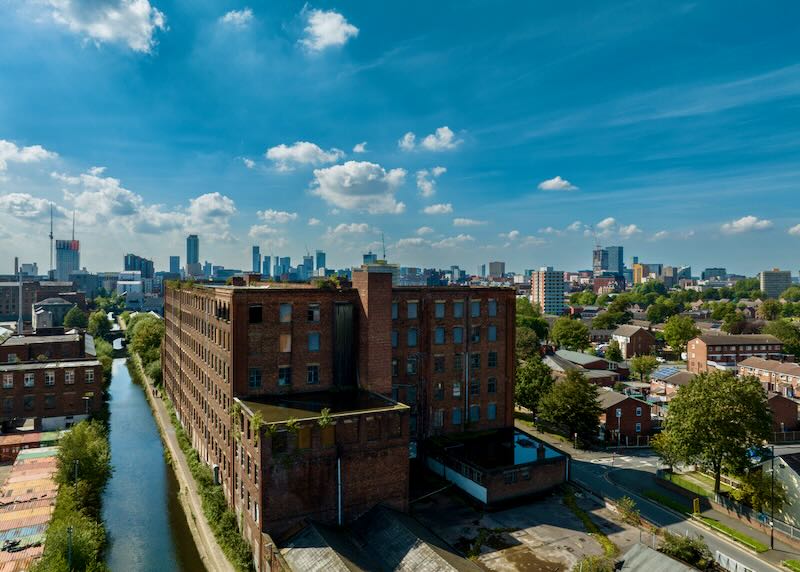
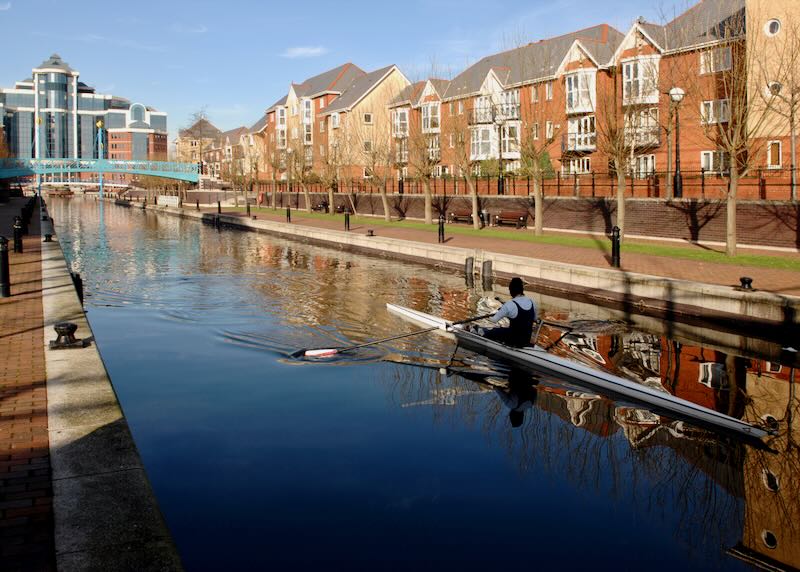
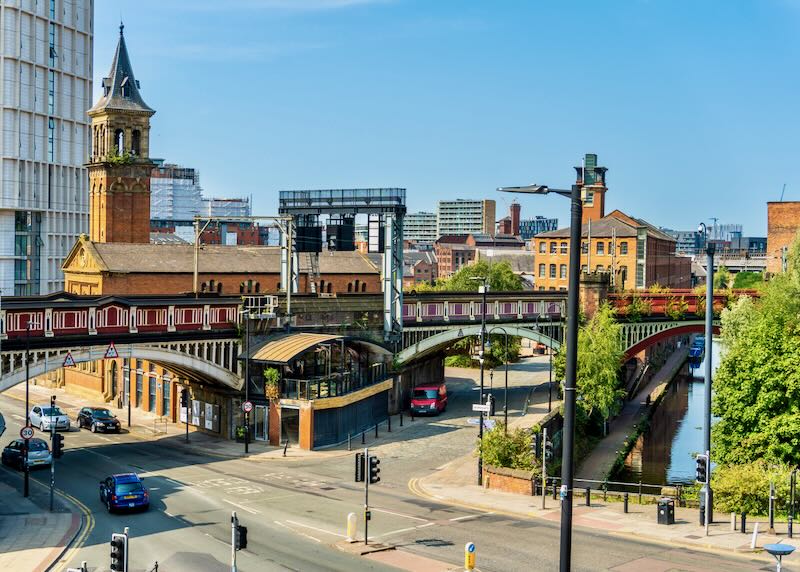
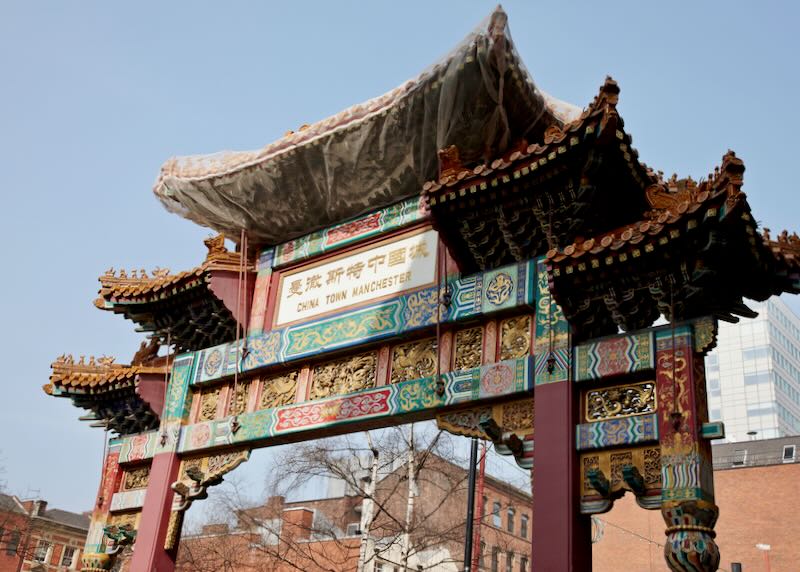
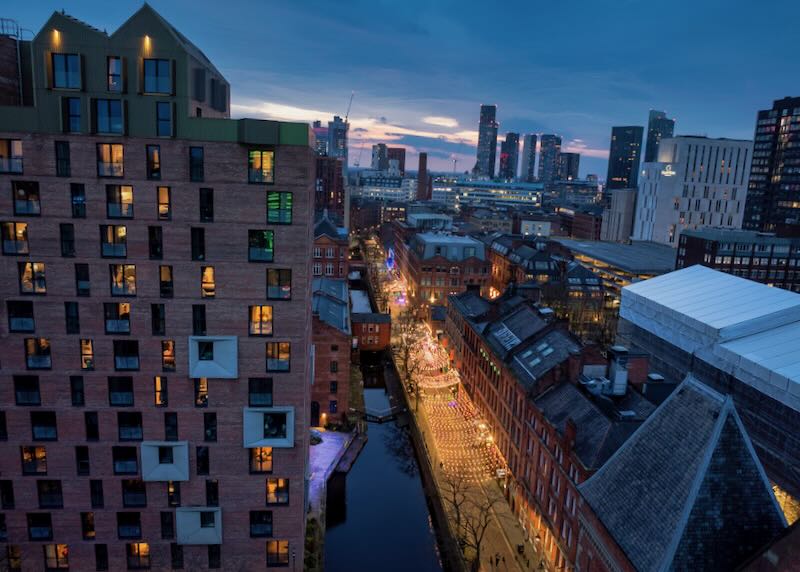
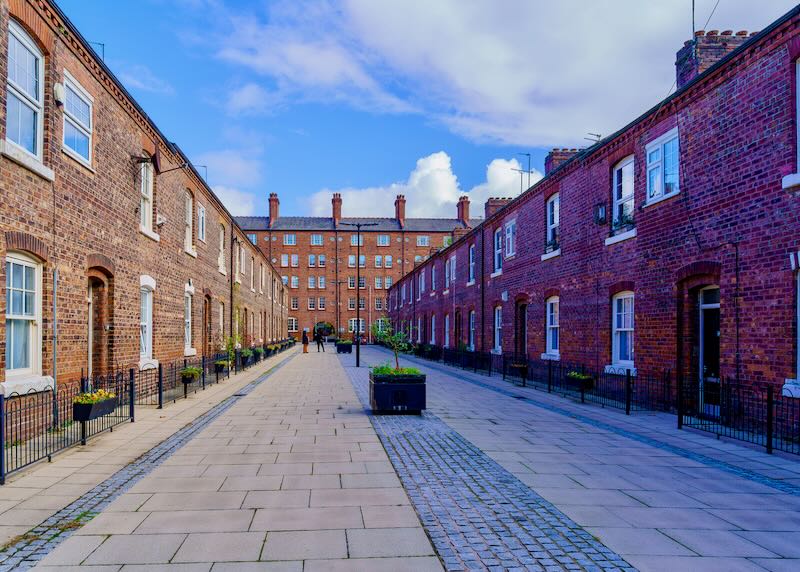
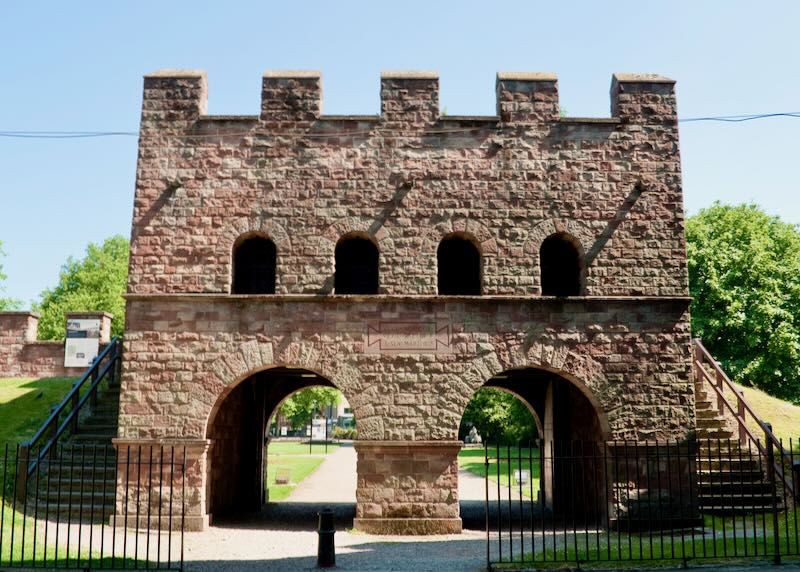
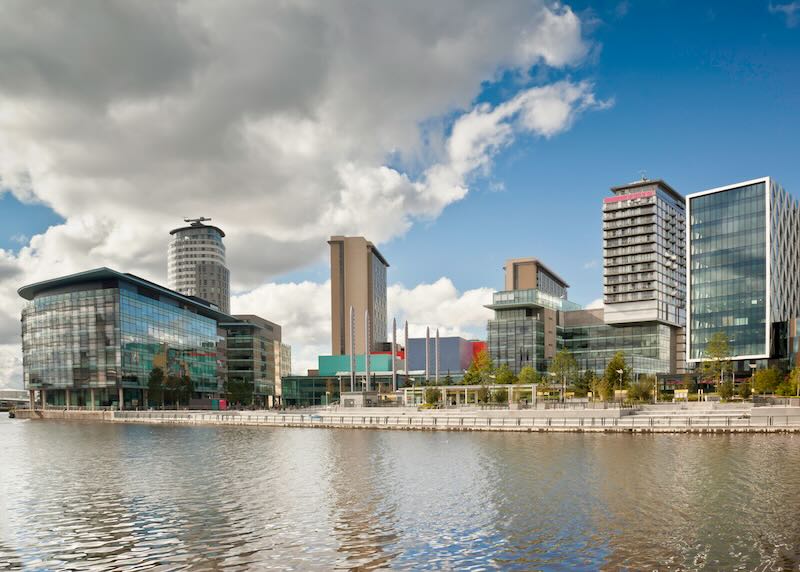
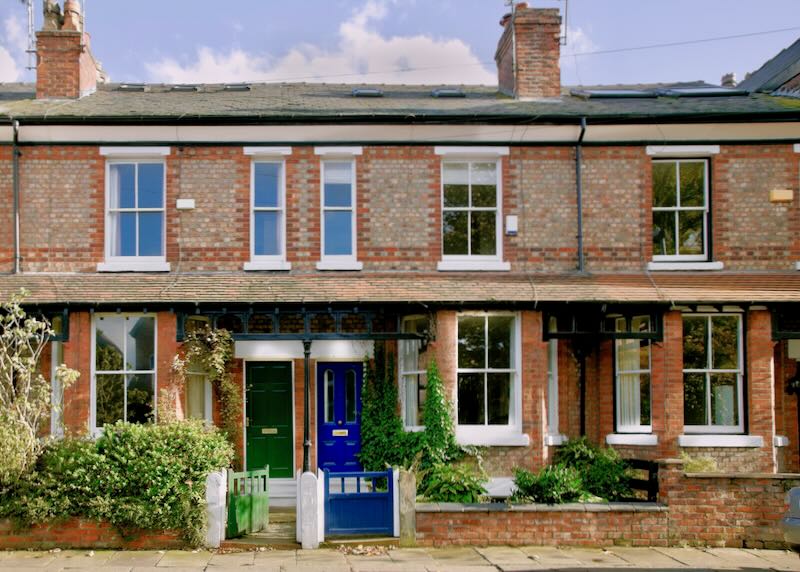
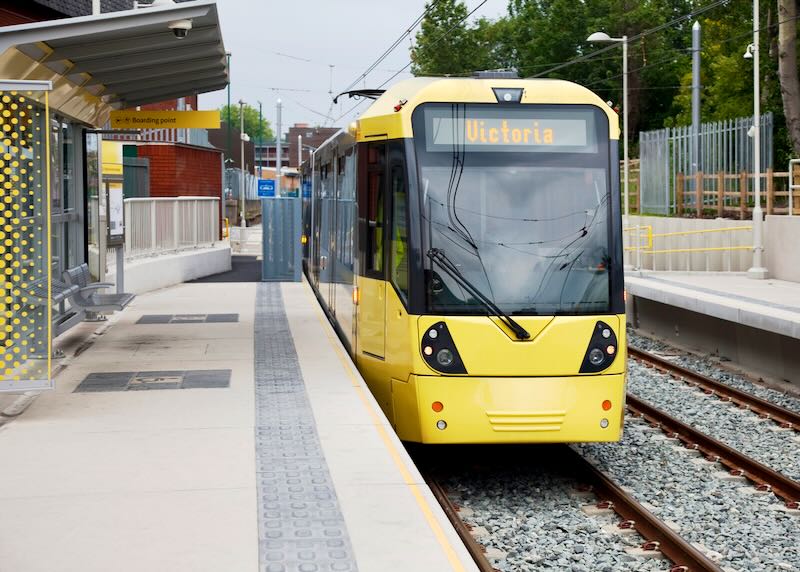
About Santorini Dave